Determiners are words that come before nouns and provide information about the reference of the noun. They help us understand the quantity, ownership, and specificity of the noun. These little words may seem unimportant, but they play a significant role in shaping the meaning and clarity of a sentence. In this article, we’ll explore what determiners are, why they’re important, different types, and how to use them effectively with example sentences. So let’s get started!
Table of Contents
What are Determiners?
Determiners are words that come before a noun to specify quantity, possession, definiteness, or specificity. They help clarify which noun we are talking about in a sentence.
Examples:
- This book is interesting. (Specifies a particular book)
- Many students attended the event. (Shows quantity)
- My car is new. (Indicates possession)
Types of Determiners
Here are some basic types of determiners:
Articles
Articles are a subset of determiners and include the definite article “the” and the indefinite articles “a” and “an.” They are used to specify whether a noun is definite (referring to a particular item) or indefinite (referring to any item in a general sense).
Example: Please bring a glass of water for me.
Demonstratives
They indicate the proximity of the noun. They include “this,” “that,” “these,” and “those.”
Example: I like those paintings.
Quantifiers
Quantifiers provide information about the quantity or amount of a noun. Common quantifiers include “some,” “many,” “a few,” “several,” “all,” “no,” and “much.”
Example: I have some chocolates in my bag.
Possessives
They show ownership or possession. They include “my,” “your,” “his,” “her,” “its,” “our,” and “their.”
Example: This is my phone.
Interrogatives
Used to ask questions about nouns. Common interrogative determiners include “which,” “what,” “whose,” and “whosever.”
Example: Which book do you want?
Distributives
Distributive determiner indicate that something is taken one at a time or individually. Common distributive determiners include “each” and “every.”
Example: Each student should complete the assignment.
Cardinal Numbers
Cardinal numbers, such as “one,” “two,” “three,” etc., can function as determiners when specifying a quantity.
Example: We are five siblings.
Ordinal Numbers
Ordinal numbers, like “first,” “second,” “third,” etc., can also act as determiners to indicate the position or order of a noun.
Example: She is the first person in line.
Negative determiners
They express the absence or lack of something and include words like “no,” “none,” and “neither.”
Example: No students attended the lecture.
Exclamative determiner
They are used to express surprise, emotion, or strong feelings and include words like “what” and “such.”
Example: What a beautiful sight!
Universal determiner
They refer to all members of a group or category. Example: “All,” “Every,” “Each.”
Example: Every student passed the exam.
Determiners of difference
They emphasize distinctions or differences between items. Examples include “other,” “another,” and “different.”
Example: We have no other option.
Relative Determiners
They Introduce relative clauses and specify the noun they refer to. They include: “what,” “which,” “that,”
Example: This is the house where I grew up.
Example Sentences
- I have some apples.
- She bought three books.
- Can you pass me the salt?
- Many students passed the test.
- This is my favorite movie.
- Those cookies are delicious.
- Give me a few minutes.
- We saw several birds in the park.
- Is there any milk in the fridge?
- Both of them are coming to the party.
- None of the guests arrived on time.
- I want that beautiful dress.
- Many people attended the concert.
- All the children were excited.
- She has little patience.
- He has no money left.
- I need some help with my homework.
- Both of my parents are doctors.
List of determiners
- The
- A
- An
- My
- Your
- His
- Her
- Its
- Our
- Their
- This
- These
- That
- Those
- Some
- Any
- All
- Both
- Neither
- Either
- Each
- Every
- Much
- Many
- Few
- Several
- Most
- Fewer
- Less
- Little
- Much
- More
- None
- No
- Other
- Another
- Enough
- Plenty of
- Such
- What
- Which
- Whose
- One
- Two
- Three
- First
- Second
- Third
- Last
- Next
- Final
- Half
- Twice
- Several
- A lot of
- All (of)
- Both (of)
- Half (of)
- Either (of)
- Neither (of)
- Some (of)
- Most (of)
- Many (of
FAQs
A determiner is a word placed before a noun to indicate which one, how many, or whose it is. Examples include the, this, some, my, and many.
The four main types of determiners are:
Articles (a, an, the)
Demonstratives (this, that, these, those)
Quantifiers (some, many, few, several)
Possessives (my, your, his, her)
A determiner specifies a noun (this book, my pen, many apples), while an adjective describes a noun’s quality (red book, big pen, sweet apples).
Yes, a sentence can have two determiners if they serve different functions. Example:
All my friends are coming. (All = quantity, my = possession)
Yes, some is a quantifier determiner, used to indicate an unspecified amount. Example: I bought some apples.
Look for a word before a noun that helps specify which one, how many, or whose it is. Example: That house is beautiful. (That is the determiner).
Conclusion
Determiners are essential in English grammar as they modify nouns to provide clarity, quantity, possession, or specificity. They help define whether we are talking about something specific or general. Understanding the different types—articles, demonstratives, possessives, quantifiers, distributives, and numbers—ensures better sentence structure and communication. By mastering determiners, you can enhance your fluency and make your writing more precise and effective.
Read More

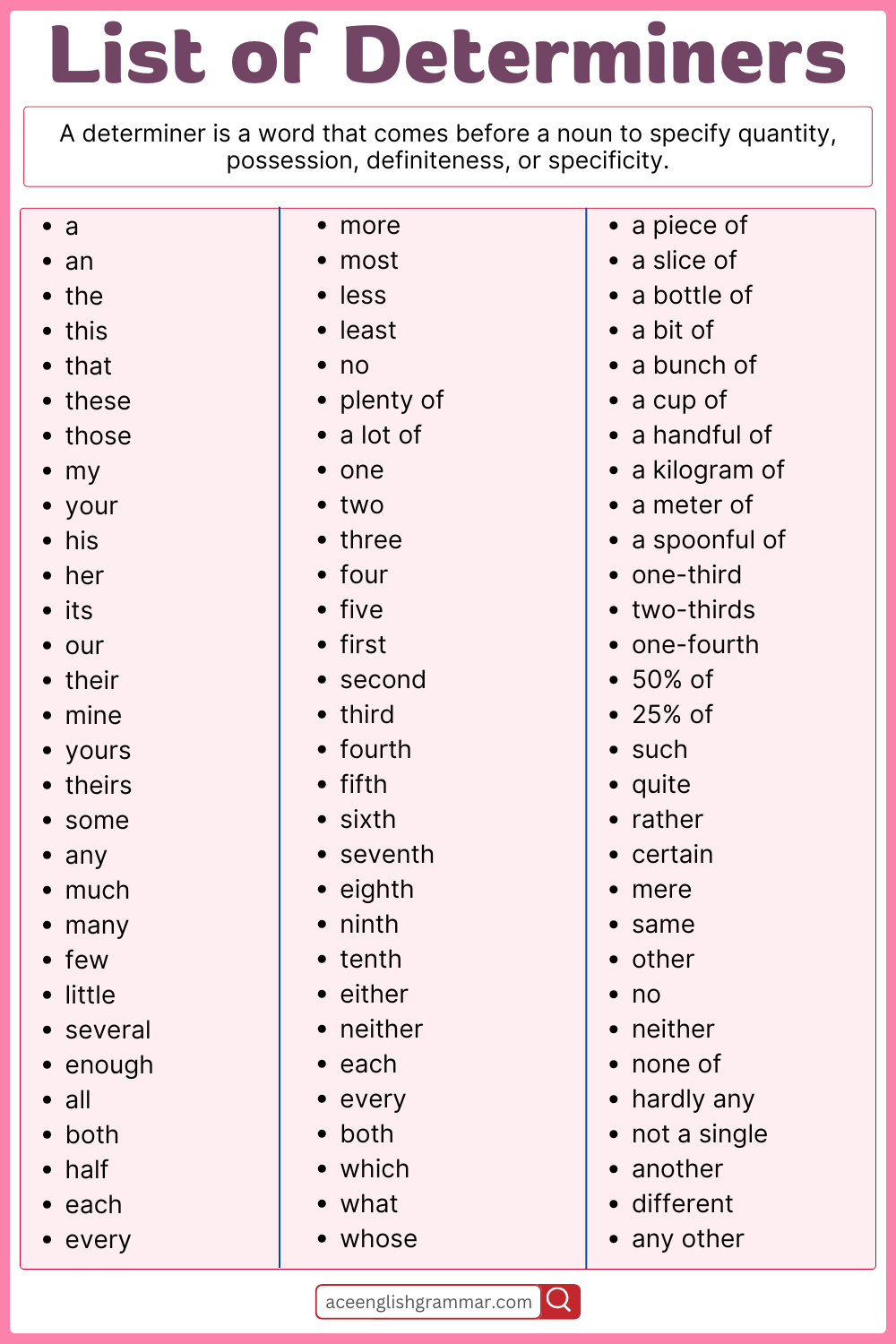
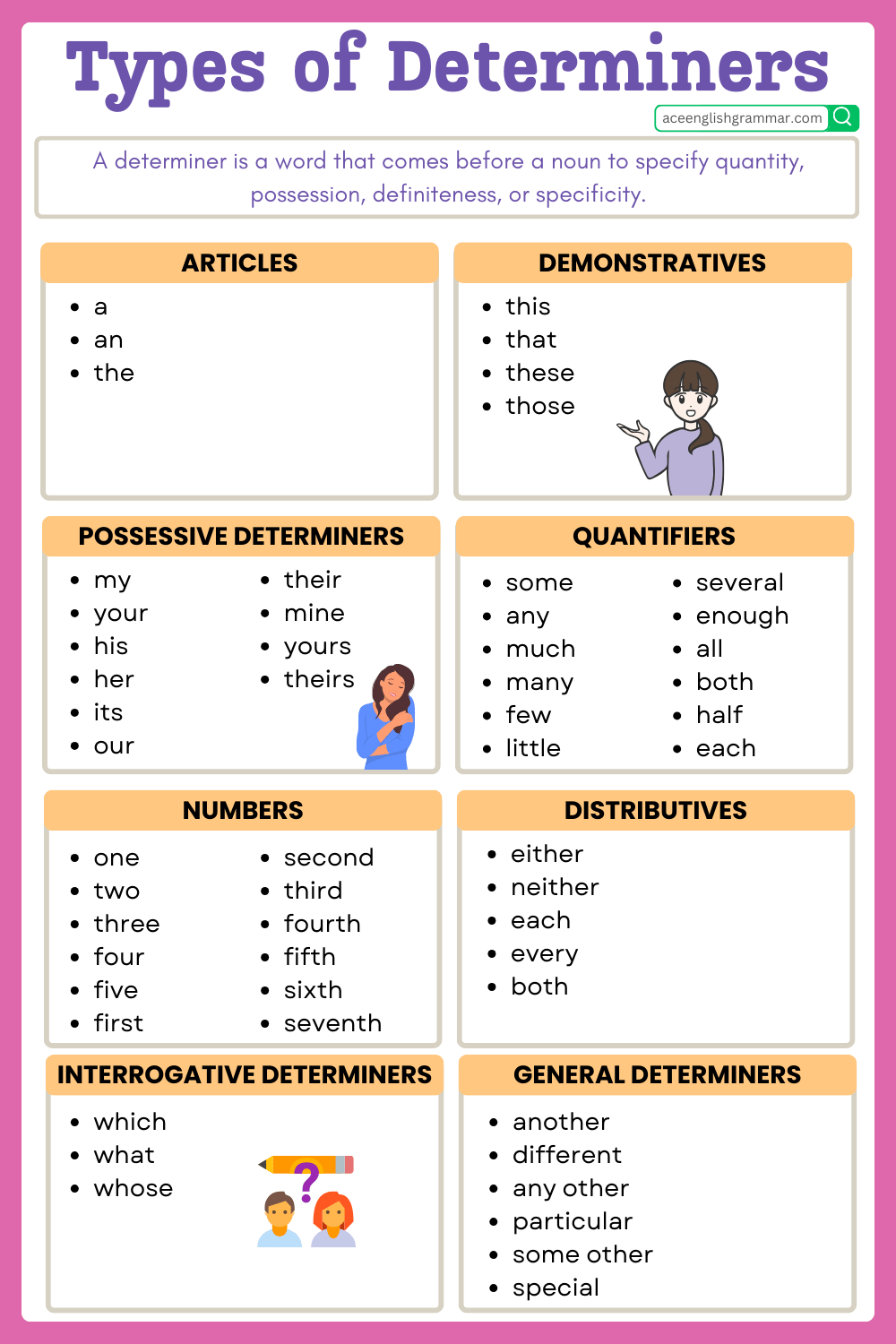
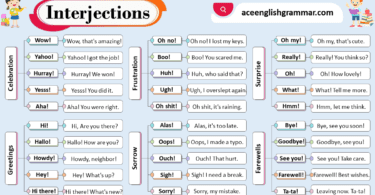
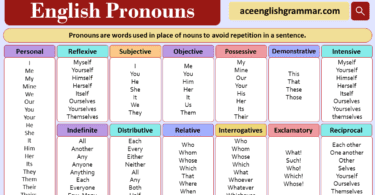
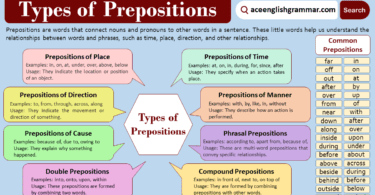
Leave a Comment